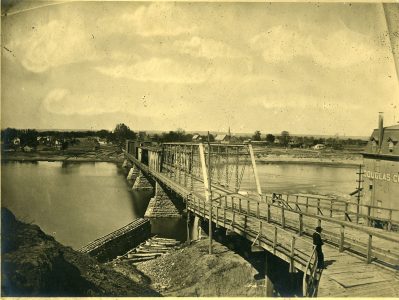Lawrence City Commission approves agreement to create historical marker at site where three Black men were lynched in 1882

photo by: Watkins Museum of History
The old bridge across the Kansas River near downtown Lawrence is pictured in 1866. The bridge was used to lynch three black men in 1882.
City leaders have voted to move forward with a project that would add a historical marker at a site where three Black men were lynched in 1882 near present-day City Hall.
As part of its meeting Tuesday, the Lawrence City Commission voted unanimously to authorize an agreement with the Community Remembrance Project Coalition for the Equal Justice Initiative historical marker project. The Lawrence chapter of the NAACP has been working with the EJI, the creator of a national lynching memorial in Montgomery, Ala., to erect a historical marker in Lawrence with information about the lynching.
Ursula Minor, president of the local NAACP chapter, told the commission that the lynchings are an important part of the city’s history that is equally relevant today.
“It is our hope, at the NAACP, that the marker will bring the community together to talk about the past and bring it to the present, as the Black community is facing modern-day lynchings in 2020,” Minor said.
Kerry Altenbernd, chair of the NAACP History Committee working on the project, told the commission that the marker will be near a stone pier that still stands today that once supported the bridge across the Kansas River that was used to hang the men. Altenbernd said one side of the marker would discuss the history of lynching in the U.S. and the other the case of the three men.
In the summer of 1882, the body of David Bausman, who was white, was pulled from the Kansas River, according to newspaper and other local archives reviewed by the Journal-World. Pete Vinegar, Isaac King and George Robertson, all of whom were Black, were arrested in connection with the murder, as was Vinegar’s teenage daughter Margaret “Sis” Vinegar. Pete Vinegar was never charged with a crime. Before a trial could be held, Vinegar, King and Robertson were lynched from a bridge over the river by a mob of men who broke into the jail in the middle of the night.
Accounts of Bausman’s murder in historical documents are varied, but they seem to agree that Bausman, who was in his mid-40s, had been having sex with Margaret, who was only about 14 — statutory rape under current Kansas law — when King and Robertson came upon the scene and allegedly killed him. Though Margaret was not hanged, she was convicted of murder and later died in prison. She was accused of conspiring with the other two men to rob Bausman, though her attorney argued there was no evidence for that accusation.
Mayor Jennifer Ananda said that the community has spent a lot of time not talking about such aspects of its history, and that she thought the project was an opportunity to do better.
“I think that we have so much, historically and currently, to answer for on these issues,” Ananda said.
City Commission Meeting 09/01/20







